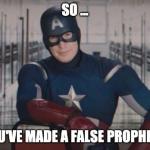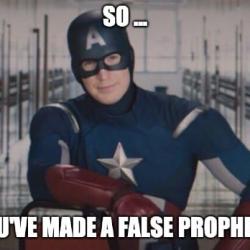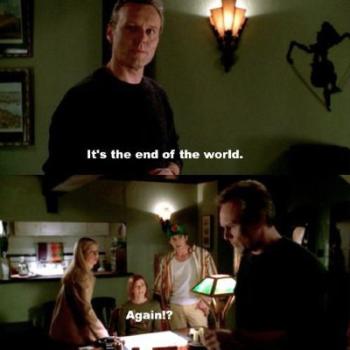“We must all condemn political violence” everyone said.
And thus, because the verb “condemn” is a speech-act, a “performative utterance,” everyone did as they said. The deed was performed in the utterance and “political violence” was, in fact, condemned by everyone.
This is encouraging. It’s always nice to see everyone in complete agreement. Unanimity like that is a rare sight.
I mean, yes, it’s a bit troubling that the vast category of “political violence” was being reduced to refer only to lethal violence and to the deliberate, active assassination of political opponents. But even so, it was encouraging to see everyone agreeing that murdering your political opponents is Bad. Because it is.
 Of course, even before this ritualized public condemnation, it was pretty clear that everyone already agreed on that point. Murdering people was already illegal, and nobody had been going around advocating that it should be somehow decriminalized.
Of course, even before this ritualized public condemnation, it was pretty clear that everyone already agreed on that point. Murdering people was already illegal, and nobody had been going around advocating that it should be somehow decriminalized.
But, still, it was good to hear everyone speaking up and speaking out to affirm that, yes, murder should remain a crime, and that it should be regarded as not only illegal, but immoral.
Kudos to everyone for getting that right.
The weird thing, though, about everyone getting that right, was that an awful lot of the people who were getting it right didn’t seem to notice — or, perhaps, refused to notice — that all of those other people were getting it right too.
Here, again, I’m reminded of the Anti-Kitten-Burning Coalition and of the way that condemnation and indignation sometimes get twisted into something competitive and accusatory.
We see this happen whenever something occurs that most people — an overwhelming majority of people — find shocking and appalling. It happens if this horrible thing is small and local, like an act of unspeakable cruelty to animals, and it happens when the horrible thing is national news, like a cold-blooded assassination. Almost everyone — 99.99% of us — feels the same sense of shock and sadness and anger and indignation. Most people express this by saying so, saying something like “Oh God, that’s horrible! How could anyone do such a thing?”
But others — people who, again, correctly agree that the Very Bad Thing is Very Bad — weirdly redirect that horror and anger and indignation. Their response is not directed at the Very Bad Thing, but rather at some imagined group of other people who they need to believe do not share their horror and anger.
So while most of the community is saying “Someone burned a kitten? That’s terrible!” the misdirected indignation of the Anti-Kitten-Burning Coalition causes them to say, instead, “You people make me sick, defending this and saying it’s perfectly fine to go around burning kittens!”
That might be a reasonable response if any such group of kitten-burning defenders existed. But it doesn’t. It exists only in their imagination. They are loudly and indignantly shouting back at voices that do not exist outside of their own heads.
And so, in a sense, the AKBC isn’t really condemning kitten-burning as much as it is flattering itself by accusing everyone else of failing to condemn kitten-burning — even though no one, other than the perpetrators, is actually failing to do so.
While most of the community is reeling from witnessing a Very Bad Thing and unanimously agreeing that no one should do Very Bad Things, the AKBC is focused, instead, on saying something else, namely: I’m Better Than you are.
I suspect this comes, in part, from insecurity — the moral anxiety of “Are we the baddies?” — of semi-consciously realizing/dreading that your life does not seem to be the life of the Good Guys in the story. The sudden eruption of an extravagant evil thus affords you the rare and wonderful opportunity to at last feel as though you are the one with the moral high ground. It seems undeniably true that you are, in fact, Better Than a kitten-burner or a murderous school shooter. Therefore you must be Good. And now, as a certifiably Good Person, you have the right to lecture all of your neighbors for their moral inferiority.
Or it may be that the AKBC is just getting caught up in the intensity of their emotions. It is, after all, right and righteous to be indignant and to feel indignant when confronted with something as horrifically cruel as kitten-burning. This is honest indignation and, as William Blake said, “The voice of honest indignation is the voice of God.” When you’re hearing the voice of God it’s perhaps easy to have that go to your head so much that you maybe start thinking that you’re God’s Extra Special Favorite.
But that’s where the problems start for the AKBC. It is never bad to say “Burning kittens is wrong” or to say “murdering people is wrong.” It is meet and right so to do. The problem arises when you start to think that saying “Burning kittens is wrong” or to say “murdering people is wrong” makes you exceptional.
It’s not exceptional. It’s the lowest of basic moral standards. Everybody meets that standard other than, you know, actual kitten-burners and murderers — which is why everyone else finds them shocking and horrifying.
The only way to trick yourself into thinking that affirming the most basic minimum standards of morality makes you exceptional is to also trick yourself into “believing” that most of your neighbors are exceptionally wicked.
And so, whenever we all witness some act that is truly exceptionally wicked — a kitten-burning or a cold-blooded assassination — you will need to trick yourself into “believing” that there’s nothing exceptional about it, pretending to believe that most of your neighbors secretly approve of such deeds.
While it might be theoretically true that I could think of myself as “morally superior” to a person who was openly advocating for kitten-torture and the legalization of murder, that still wouldn’t give me anything to brag about, since pretty much everybody is also morally superior to such a depraved monster. Going around and demanding that everyone else defer to my superior moral judgment because I’m better than the imaginary depraved monster in my head wouldn’t just be deeply weird behavior, it would also be corrosive to my soul and my sanity.
All of which brings us back to the competitive, accusatory undertones of the very first sentence up there at the very top of this post: “We must all condemn political violence.”
That’s a paraphrase and an approximate generalization, but I think it accurately conveys many of the actual public statements of — or perhaps about — the condemnation of political violence.
“We must all condemn political violence” implicitly contains and suggests “I condemn political violence,” but it does not necessarily mean the same thing.
Consider the difference between these two statements from your housemate:
“I promise to empty the dishwasher when it is my turn.”
“Everyone should promise to empty the dishwasher when it is their turn.”
If the housemate is someone you trust, then the second statement can be accepted as roughly equivalent to the first. But if the housemate is someone you have reason not to trust, then the second statement might seem to be a way of evading that promise while simultaneously, passive-aggressively, also being a vague accusation against unnamed others.
In a context of mutual trust and mutual trustworthiness, both statements seem to affirm that everyone is in unanimous agreement. In the absence of such mutual trust and mutual trustworthiness, the appearance of unanimous agreement is always a bit suspect.
And but so still, again, I am at least pleased to see that we are all in apparent unanimous agreement that cold-blooded murder is a Very Bad Thing and that it should remain a crime — something regarded as both immoral and illegal. Maybe that ain’t much, but in 2025, I’ll take what I can get.












